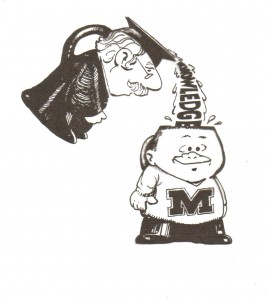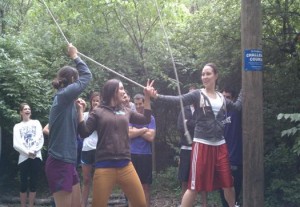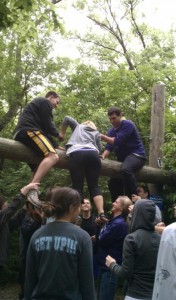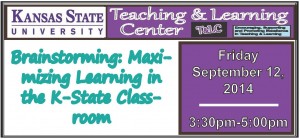
Category: RESOURCES
Brainstorming Event video
The first Day of class
Graduate Teaching Assistant Training
Fall 2014
It’s the first day of class! What do I do!??
Kevin
Hospitality Management & Dietetics
Kansas State University
Outline
•That first day and…
–Teaching Beliefs & Perspectives
–Teaching Relationships
–Teaching Tips
Teaching Beliefs
•What is effective teaching?

•Effective teaching
–Who should decide?
–Customers?
•Value
–Art & Delivery
OR
–Content & Technical Skill
Hospital Food
Teaching Perspectives
•What are the best practicesof teachers?
•What are the worst practicesof teachers?
•Best practices
–Engaging with the class, conversational
–Organized & consistent
–Enthusiastic
–Able to relate subject to real life
–Say what is important
–Passionate
–Flexible
–Hands-on & participative
•Worst practices
–Reading from slides
–Monotone & no emotion, dry & boring
–Unorganized, not prepared
–Useless busy work
–Unpredictable tests -questions don’t come from teaching material
–Not understanding when students don’t understand
–Contradictory
–Condescending or unapproachable
My Turn
What I think are the best practicesof students
–They are honest with me
–They try and they take some risk
–They come to work
–They accept criticism
–They bridge concepts with life and future practice
–They ask guest speakers, the instructor, and their peers good questions
–They understand I am human and mess up
What I think are the worst practicesof students?
–Not assertive
–Poor attitude
–Don’t try to apply material outside comfort zone
–Just want to get things “done”
–Need lots of pre-grading
Hospital Food
More -Teaching Relationships
•Learn from your students
•Admit to yourself and your students that you still have a lot to learn
–you’ll foster relationships while maintaining classroom authority.
Material students won’t forget
requires a
teacher they won’t forget
Teaching Tips
•Get creative & think differently
–Content vs. delivery
OR
–Content AND delivery
•Use current events
•Use things/topics they do like in the program or field to your advantage
•10% exception

Thinking Differently
Nutrition Care Process
1.Nutrition Assessment
2.Nutrition Diagnosis
3.Nutrition Intervention
4.Screening and Referral
5.Outcomes
Financial Care Process
1.Financial Assessment
2.Financial Diagnosis
3.Financial Intervention
4.Communication
5.Outcomes
Thinking Differently

Management & Leadership
Applying Leadership and Management Theories
•
•K-State Campus Challenge Course
•&
•HMD 560 Students



Teaching Tips
•Class “committees”
–Technology committee
–Hospitality committee
–Quality control committee
•Why?
Future
•GTA roles differ
–Grading to full class ownership
–Lab/practicum to really big lectures
•Future Vita or Resume
–Seek feedback and data about your teaching
•How?
•Do it now –
–Why?
Future Vita or Resume
–Seek feedback and data about your teaching
•How?
•Future Vita or Resume
–Why?
Kevin Sauer –Vita
Education
Job #1
Job #2
Fall 2014, Graduate Teaching Assistant, K-State
WHAT DO YOU WANT THIS TO SAY!
Summary
•Foster teaching relationships
–Ask about best/worst teaching practices
•Then, revisit this (remember, relationships)
•Learn from students
–Admit your limits (remember, relationships)
•Get creative and think differently
•Format/build your resume now
Thank you
Kevin Sauer
105 Justin Hall
ksauer@ksu.edu
785-532-5581
Metacognition video
Keep Calm and Teach on
Keep Calm and Teach on
August 26, 2014
Dr. Jana Fallin Ph.D.
In this Workshop Dr. Fallin shared the following points you should remember:
- Eye contact.
- Proximity
- Clarity in directions and questioning
- Use learning preferences. VARK (Aural – Visual – Reading/Wrtiting – Kinesthetic.
- Change pace or activities every 7 to 10 minutes.
- Use talk to your partner (TTYP) strategy.
- Be enthusiastic
- Don’t talk to much.
- Include different types of grading.
- Video tape yourself teaching.
- Be careful with power point. It can put them to sleep.
- Ultra important… Have a plan.
Failing to Plan is Planning to Fail.
Discussion points:
- How can you get the students excited about your class?
- How can you get their attention?

Recent Comments